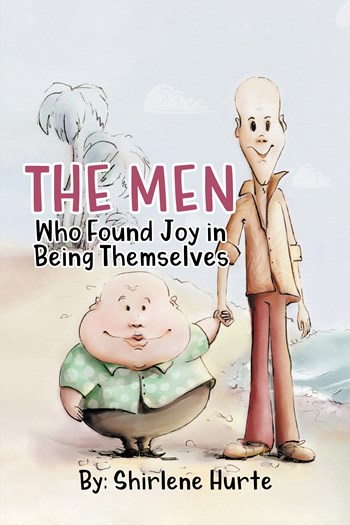Children’s books provide authors and parents alike an arena with which to enrich the lives of young readers. Be it a vibrant board book or a cleverly constructed ‘early reader,’ a young, impressionable imagination is likely to learn any number of life lessons within the pages of their favorite title. While these lessons have traditionally included timeless concepts like caring and sharing, our ever-changing world continues to add talking points to every parent’s list. With that in mind, Shirlene Hurte’s THE MEN WHO FOUND JOY IN BEING THEMSELVES places a much-needed spotlight on self-love and acceptance, cleverly exploring both topics through the lens of a whimsical, illustrated adventure.
THE MEN WHO FOUND JOY IN BEING THEMSELVES tells the story of “a tall man with a long face,” and a “short man with a round face” who, unbeknownst to each other, live on the same island. Both men are initially content with their bodies—the tall man enjoys the perks of his height, and the short man is happy to be close to the ground. One day, after a chance meeting, the men became envious of each other. Inexplicably, their desire to switch bodies becomes a reality. Each man returns to his side of the island to explore his new body. Unfortunately, both men immediately succumb to buyer’s remorse, each regretting their decision. Luckily, another chance meeting provides the two men an opportunity to switch back to their original bodies, no worse for the wear, and with a greater appreciation for their respective lots in life.
THE MEN WHO FOUND JOY IN BEING THEMSELVES has a lot going for it. The combination of colorful prose with a well-paced narrative makes for a fun read, and the fact that Hurte manages to discuss body image without once using the word ‘skinny’ or ‘fat’ is a testament to her skill as a writer. The illustrations, presumably provided by Hurte, consist of stylized ink caricatures that consistently compliment the text. Setting aside the timely message and captivating artwork, THE MEN WHO FOUND JOY IN BEING THEMSELVES suffers in the layout department. While the story is well-written, the lack of integration between the text and the illustrations feels like a missed opportunity. Where ample room exists on each page for a handful of sentences, Hurte’s narrative is relegated to dense paragraphs. To make matters worse, the bold, blocky font hurts the overall legibility. This, coupled with the monochromatic, washed-out background that runs from cover to cover, ultimately does a massive disservice to an otherwise beautifully-illustrated book. Additionally, the author’s liberal use of deus ex machina (a plot device whereby a seemingly unsolvable problem is abruptly resolved by an unexpected and unlikely occurrence) undercuts the message of the story. With the numerous ways one can imagine a pair of characters ‘trading places,’ simply having them magically switch bodies without a shred of context or explanation stretches the realm of believability, even for a children’s book.
Still, Hurte should be commended for tackling what is often viewed as an adolescent issue with a picture-book length story. Body image issues often take root far younger than most realize, and complex ideas like self-love and acceptance can be difficult to translate through a five-hundred-word text. In that regard, THE MEN WHO FOUND JOY IN BEING THEMSELVES succeeds, even if the overall effect falls short.
Shirlene Hurte’s THE MEN WHO FOUND JOY IN BEING THEMSELVES is a well-intentioned and well-written picture book with a timely message.
~James Weiskittel for IndieReader

